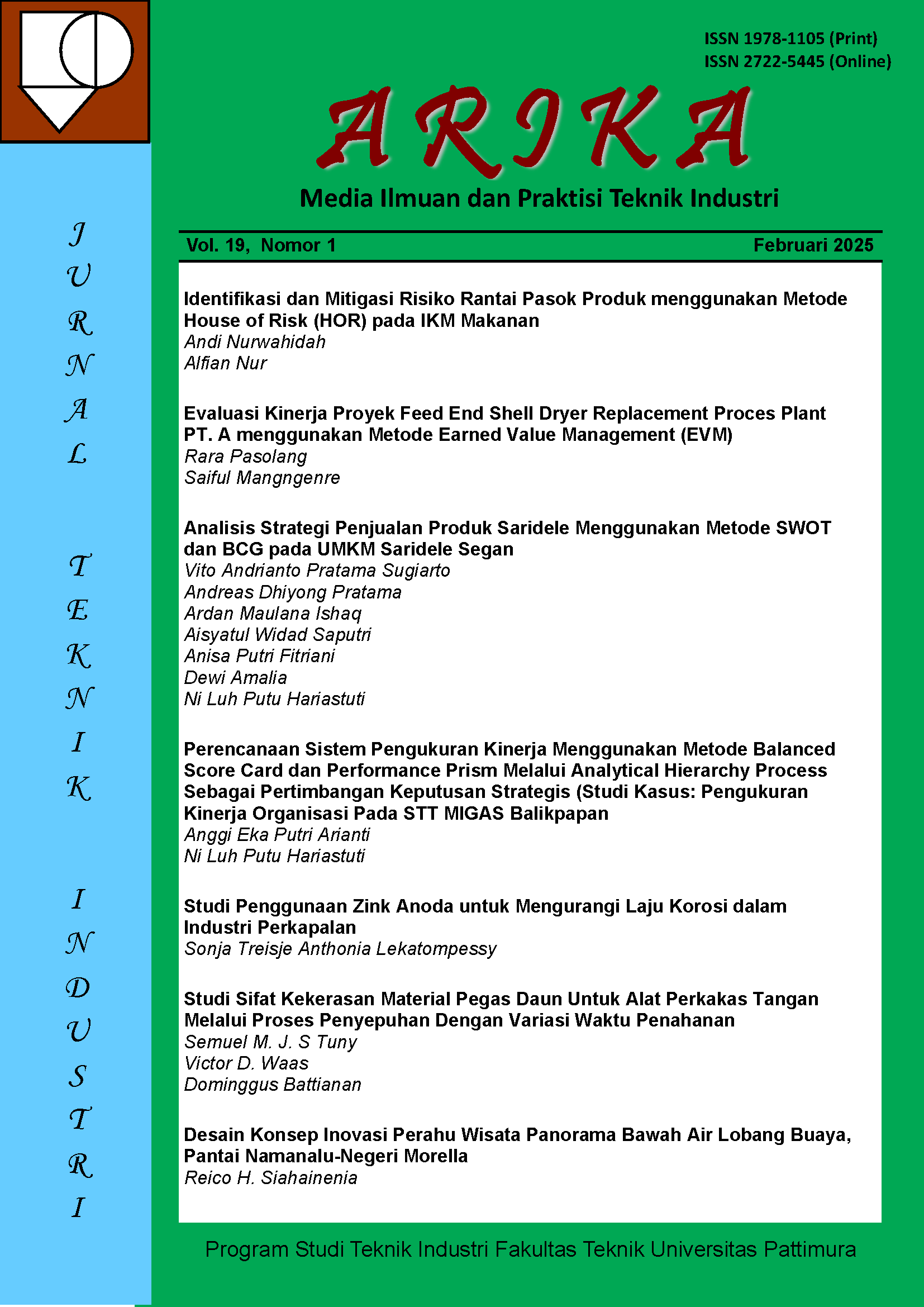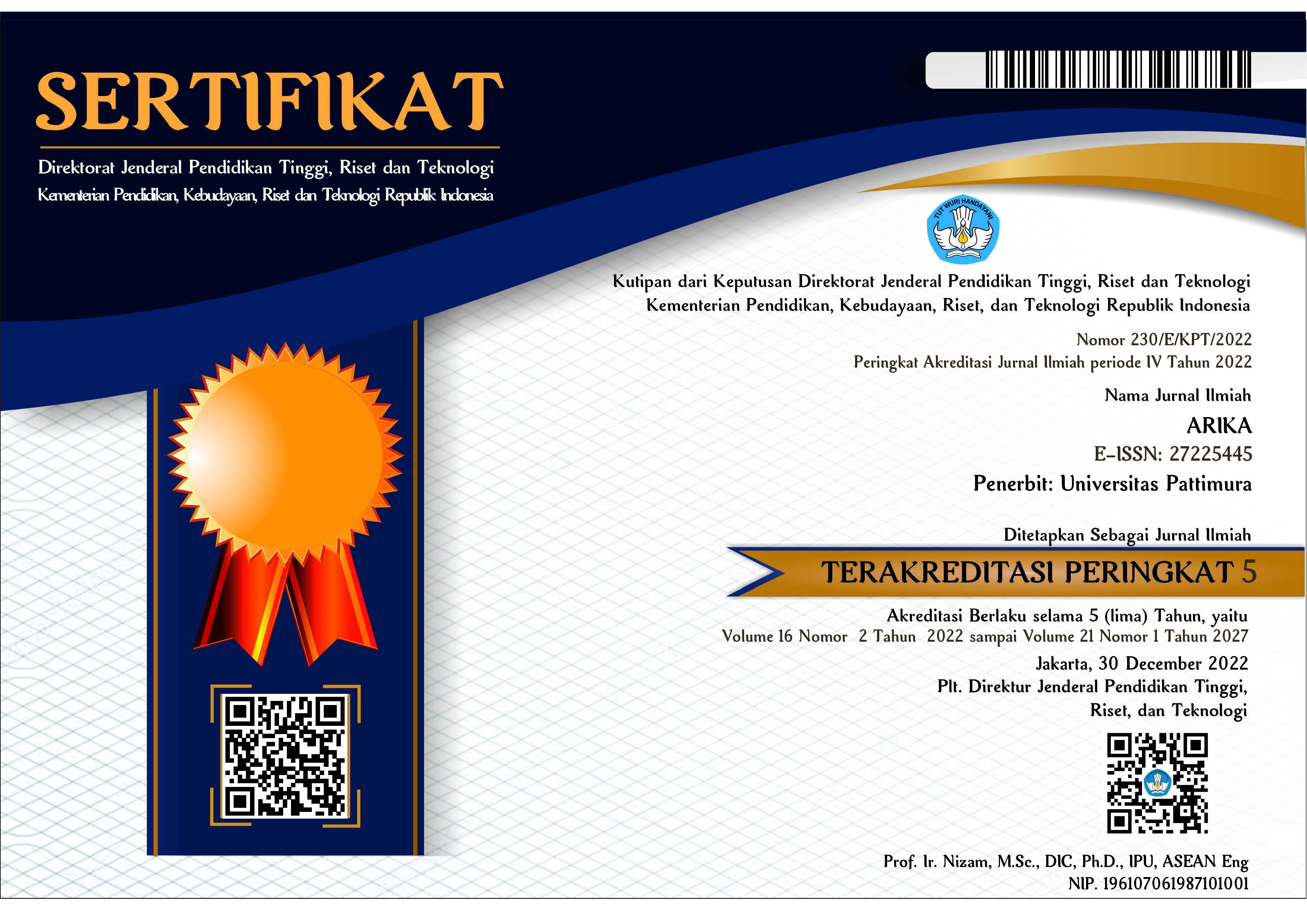Evaluasi Kinerja Proyek Feed End Shell Dryer Replacement Proces Plant PT. A menggunakan Metode Earned Value Management (EVM)
Evaluation of Project Performance for Feed End Shell Dryer Replacement Process Plant PT. A Using the Earned Value Management (EVM) Method
Abstract
Dryer is one of the production equipment that plays an important role in the production process because it is a production motor. Dryer itself functions to dry ORE material from Wet Of Storage to Dryer Of Storage. From the assessment carried out, an indication of thinning of the Shell wall was found which is at risk of damage to production equipment. Therefore, the replacement of the Shell Dryer feed end must be done. This study aims to analyze project performance and how the impact is based on the results of project performance. Data analysis in this study uses the Earned Value Management (EVM) method. The results showed that the project performance in terms of time (Schedulle Performace Index) was 0.70 <1, meaning that the performance of the project implementation was delayed and from the cost aspect (Cost Performance Index) of 1.17>1, meaning that the costs incurred were smaller than the planning. Furthermore, calculations are carried out for the remaining work (Estimate to complete) and the estimated total cost and time of the entire project. The remaining work is expected to cost $1,466,391.70 for 10 days so that the total cost (Estimate At Completation) is expected to be $6,307,566.02 for 33 days. So it can be concluded that the process of replacing the feed end shell Dryer is delayed due to many factors, one of which is the project area which is a limited area.
Downloads
References
Anggraini, M. S. D., Rachmadita, R. N., & Rachmat, A. N. (2023). Evaluasi dan Analisa Kinerja Proyek terhadap Biaya dan Waktu Penjadwalan Menggunakan Pendekatan Earned Value Method (Studi Kasus Proyek Air Receiver Tank). Konferensi Desain dan Manufaktur serta Aplikasinya, 5 (1), 277–282.
Ariana, I. K. A., & Lestari, D. A. (2023). Analisis Kinerja Proyek Optimalisasi SPAM Gatak Kabupaten Sukoharjo dengan Metode Earned Value. Journal of Integrated System (JIS), 6 (1), 87–102.
Arifudin, R. (2012). Optimasi Proyek Penjadwalan Dengan Penyeimbangan Biaya Menggunakan Kombinasi CPM dan Algoritma Genetika. Jurnal Masyarakat Informatika, 2(4), 1-14.
Aura, F., & Novitasari, R. (2024). Analisis Perencanaan dan Pengendalian Proyek Kapal X di PT XYZ dengan Menggunakan Metode Earned Value Management. Konstruksi: Publikasi Ilmu Teknik, Perencanaan Tata Ruang dan Teknik Sipil, 2 (1), 65–72.
Dipohusodo, I. (1996). Manajemen Proyek dan Konstruksi Jilid 1 dan Jilid 2,.
Helmi, Amani, W., & Irawan, B. (2012). Perbandingan Aplikasi CPM, PDM, Dan Teknik Bar Chart kurva S Pada Optimalisasi Penjadwalan Proyek. Buletin Ilmiah Math. Stat. dan Terapannya (Bimaster), 01(1), 15–22.
Husen, A. (2009). Manajemen Proyek: Perencanaan, Penjadwalan & Pengendalian Proyek. Yogyakarta (Andi, Ed.).
Levis, & Atherley. (1996). Delay Construction. Cahner Books.
Pamadi, M., Umar, U. H., & Chen, N. (2021). Analisis Penjadwalan Proyek Menggunakan Metode EVA (Earned Value Analysis) pada Proyek Pembangunan Ruko De Monde unction – Pasir Putih, Batam. Journal of Civil Engineering and Planning, 2 (2), 188–202.
Pancaningrum, E., Hartono, W., & Sugiyarto, S. (2018). Pengendalian Biaya Dan Waktu Dengan Menerapkan Metode Earned Value Analysis (EVA) Menggunakan Software Microsoft Project 2007 (Studi Kasus: Proyek Pembangunan Hotel Brother 2 Solo Baru, Sukoharjo). Jurnal Matriks Teknik Sipil, 6(1).
Priyo, M., & Indraga, K. F. (2015). Analisis Kinerja Biaya Dan Jadwal Terpadu Dengan Konsep Earned Value Method (Studi Kasus: Proyek Pembangunan Gedung). Jurnal Ilmiah Semesta Teknika, 18(2), 106–121.
Pujihastuti, S. Y., & Priyo, M. (2012). Penerapan Metode Nilai Hasil (Earned Value Method) pada Sistem Pengendalian Proyek. Semesta Teknika, 15(2), 159–166.
Rahman, I. (2010). Earned Value Analysis terhadap biaya pada proyek pembangunan gedung (studi kasus proyek pembangunan Gedung C Fakultas MIPA UNS).
Ratih, S. Y., & Irnawan, D. (2020). Analisis Proyeksi Jadwal Dan Biaya Akhir Dengan Konsep Nilai Hasil Pada Proyek Konstruksi. Jurnal Rekayasa Konstruksi Mekanika Sipil (JRKMS), 3 (2), 97–106.
Santosa, B. (2009). Manajemen Proyek (1 ed.). Graha Ilmu.
Santoso, J. T. (2023). Manajemen Proyek Teknologi Informasi (M. Sholikan, Ed.; 1 ed.). Yayasan Prima Agus Teknik.
Soeharto, I. (1995). Manajemen proyek dari konseptual sampai operasional. Erlangga.
Suyatno. (2010). Analisis Faktor Penyebab Keterlambatan Penyelesaian Proyek Gedung (Aplikasi Model Regresi).
Utomo, G., Indriani, A. M., & Rizqy, M. (2022). Analisis Kinerja Waktu Dan Biaya Proyek Konstruksi Dengan Metode Earned Value Analysis. Jurnal Geo Ekonomi, 13 (2), 128–137.
Wahyuni, E., & Hendrawan, B. (2018). Analisis Kinerja Proyek “Y” Menggunakan Metode Earned Value Management (Studi Kasus di PT. Asian Sealand Engineering). Dalam Journal of Applied Business Administration (Vol. 2, No.1).
Copyright (c) 2025 Rara Pasolang, Saiful Mangngenre

This work is licensed under a Creative Commons Attribution-ShareAlike 4.0 International License.
An author who publishes in the ARIKA Jurnal agrees to the following terms:
- The author retains the copyright and grants ARIKA journal the right of first publication of the work simultaneously licensed under the Creative Commons Attribution-ShareAlike 4.0 License that allows others to share the work with an acknowledgment of the work's authorship and initial publication in this journal.
- The author is able to enter into separate, additional contractual arrangements for the non-exclusive distribution of the journal's published version of the work (e.g., post it to an institutional repository or publish it in a book) with the acknowledgment of its initial publication in this journal.
- The author is permitted and encouraged to post his/her work online (e.g., in institutional repositories or on their website) prior to and during the submission process, as it can lead to productive exchanges, as well as earlier and greater citation of the published work (See The Effect of Open Access).










